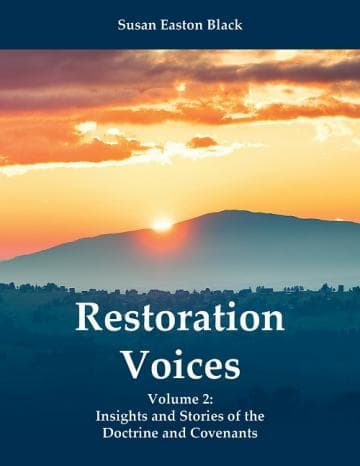Book
140 Chapters

In the Book of Mormon, we learn “all are alike unto God, ... black and white, bond and free, male and female” (2 Nephi 26:33). Throughout the history of The Church of Jesus Christ of Latter-day Saints, converts of every race and ethnicity have been invited to enter baptismal waters. In the days of the Prophet Joseph Smith, a few black male members were ordained to the priesthood. As time passed, Church leaders stopped conferring the priesthood on black males. Church records fail to present clear insights as to why this was the case.
On June 1, 1978, President Kimball asked members of the First Presidency and Quorum of the Twelve Apostles to come to the Salt Lake Temple in the attitude of fasting and prayer. At that meeting, President Kimball asked these Church leaders to join him in a prayer circle, with President Kimball acting as voice. Elder Bruce R. McConkie recalled,
When President Kimball finished his prayer, the Lord gave a revelation by the power of the Holy Ghost. ... The revelation came to the President of the Church; it also came to each individual present. ... The time had now come to extend the gospel and all its blessings and all its obligations, including the priesthood and the blessings of the house of the Lord, to those of every nation, culture, and race.[1]
Of this revelation President Kimball said,
We had this special prayer circle, then I knew that the time had come. I had a great deal to fight, of course, myself largely, because I had grown up with this thought that Negroes should not have the priesthood and I was prepared to go all the rest of my life till my death and fight for it and defend it as it was. But this revelation and assurance came to me so clearly that there was no question about it.[2]
Elder Gordon B. Hinckley said of the revelation, “Not one of us who was present on that occasion was ever quite the same after that.”[3] Elder Bruce R. McConkie said,
It was during this prayer that the revelation came. The Spirit of the Lord rested mightily upon us all; we felt something akin to what happened on the day of Pentecost and at the dedication of the Kirtland Temple. From the midst of eternity, the voice of God, conveyed by the power of the Spirit, spoke to his prophet. ... And we all heard the same voice, received the same message, and became personal witnesses that the word received was the mind and will and voice of the Lord.[4]
On September 30, 1978, at the general conference held in the Salt Lake Tabernacle, President N. Eldon Tanner, First Counselor in the First Presidency of the Church, said,
In early June of this year, the First Presidency announced that a revelation had been received by President Spencer W. Kimball extending priesthood and temple blessings to all worthy male members of the Church. President Kimball has asked that I advise the conference that after he had received this revelation, which came to him after extended meditation and prayer in the sacred rooms of the holy temple, he presented it to his counselors, who accepted it and approved it. It was then presented to the Quorum of the Twelve Apostles, who unanimously approved it, and was subsequently presented to all other General Authorities, who likewise approved it unanimously. (Official Declaration 2)
President Tanner then read the June 8, 1978, letter addressed “to all general and local priesthood officers of The Church of Jesus Christ of Latter-day Saints throughout the world” (Official Declaration 2). In the letter signed by the First Presidency—Spencer W. Kimball, N. Eldon Tanner, and Marion G. Romney—was the statement,
Every faithful, worthy man in the Church may receive the holy priesthood, with power to exercise its divine authority, and enjoy with his loved ones every blessing that flows therefrom, including the blessings of the temple. Accordingly, all worthy male members of the Church may be ordained to the priesthood without regard for race or color. Priesthood leaders are instructed to follow the policy of carefully interviewing all candidates for ordination to either the Aaronic or the Melchizedek Priesthood to insure that they meet the established standards for worthiness. (Official Declaration 2)
Those assembled in the Salt Lake Tabernacle voted to accept the revelation as the word and will of the Lord.
In November 1978 the first missionaries were sent to Nigeria. In less than ten years, Elder Neal A. Maxwell of the Twelve organized a stake in Aba, Nigeria. By 1998, twenty years after the revelation, there were an estimated half-million members of African descent in the Church—100,000 in Africa and the Caribbean and 300,000 in Brazil.
[1] Bruce R. McConkie, “All Are Alike unto God” (Brigham Young University, August 18, 1978). https://speeches.byu.edu/talks/bruce-r-mcconkie/alike-unto-god/.
[2] Church News, January 6, 1979, 4.
[3] Gordon B. Hinckley, “Priesthood Restoration,”&Ensign,&October 1988, 70.
[4] Bruce R. McConkie quote, in Randal S. Chase, New Testament Study Guide: The Infinite Atonement / Acts of the Apostles (Plain and Precious Publishing, 2011), 232.
Book
140 Chapters
Items in the BMC Archive are made publicly available for non-commercial, private use. Inclusion within the BMC Archive does not imply endorsement. Items do not represent the official views of The Church of Jesus Christ of Latter-day Saints or of Book of Mormon Central.